Garrett Lisi’s Superparticle Bet With Frank Wilczek
There is an interesting story unfolding in particle physics. The main motivation for building the Large Hadron Collider was to search for new particles. And in July of 2012, the LHC found the Higgs boson, confirming the existence of this entirely new, but widely expected elementary particle. But the Higgs wasn’t the only particle most physicists were hoping for. Also at the top of their list were “superparticles” — bosonic partners, such as “squarks,” to existing fermions, such as quarks, and fermionic partners, such as “gluinos,” to existing bosons, such as gluons. Visiting CERN, one gets the impression that there’s a giant banner hanging in the cafeteria announcing “Welcome Home Superparticles!” But superparticles haven’t shown up at the party.
There are a few reasons most high-energy theorists would like superparticles to exist. For one thing, they are necessary particle fields in superstring theory. For another thing, they potentially solve what is considered “the worst prediction in quantum field theory” — the prediction of an enormous vacuum energy, strong enough to curl spacetime up into an infinitesimal ball, due to adding up the vacuum energy contributions of all elementary particle fields. Superparticles could balance this out if some of them have masses close to the Higgs mass so that the vacuum energy could be zero or very small, as we observe. But the third, and perhaps most convincing, the reason most theorists like supersymmetry is because of unification.
In 1981, Frank Wilczek and two other theorists wrote a brief paper (“Supersymmetry and the Scale of Unification”) on an interesting finding. In our best Grand Unified Theory, in which the electromagnetic, weak, and strong forces, corresponding to the Lie group [itex]U(1) \times SU(2) \times SU(3)[/itex], are unified as parts of one force, corresponding to the [itex]Spin(10)[/itex] Lie group, the strengths of the three forces should be the same at tiny length scales. And, in fact, when we use QFT to calculate how the three force strengths change with length scale, they do appear to nearly meet in strength at a very small distance:
This is one of the reasons to believe in unification. And what Frank Wilczek found, in 1981, is that if one adds superparticles to this calculation, those three lines can, in fact, meet at a single point. Superparticles have been at the top of most theorists’ wish list ever since.
But I don’t think superparticles exist. To have those three lines meet at some point, one does not need to add a whole zoo of superparticles — you can do it by adjusting just one parameter. For example, those three lines can meet if there are eight Higgs fields instead of one. And I suspect that the bad vacuum energy prediction from QFT is not because we need superparticles, but because we don’t fully understand QFT in the gravitational context. And I think string theory is a load of hooey, and am actively working on a competing theory. So, unlike most theorists, I don’t think nature uses supersymmetry, and I don’t think superparticles will be seen by the LHC.
Since I spend most of my time at the Pacific Science Institute on the island of Maui, happily working on my own research, I don’t talk to other physicists very often. But, occasionally, I do leave my island, and one of those times was in July of 2009, when I traveled to another island, in the Azores, to attend an FQXi physics conference. At that conference, Frank Wilczek gave an excellent talk, via Skype, on unification, including expressing his confidence in supersymmetry and his expectation that superparticles would be seen at the LHC. Now, I have the greatest respect and admiration for Frank Wilczek — he possesses an amazing mind, is a great physicist, and is an all-around good human being. At a SciFoo conference earlier in 2008, where I first met Frank in person, we were asked to introduce ourselves to the room full of other attendees by providing three words that describe us. Frank’s words were “Think, Play, Repeat,” which I thought was great. (I had a sense of humor and just said “unification.”) And given that Frank was THE GUY who figured out how superparticles could help with unification, the bias for superparticles that he expressed in his talk was completely understandable. But I respectfully disagreed. And, many years previously, I had won a bet with two string theory grad students (who have since left the field) about superparticles showing up. So, at the end of Frank’s talk, I raised my hand and asked him if he would be willing to make a bet on whether superparticles would be found.
I knew I was being kind of a confrontational jerk by putting him on the spot like this. But he was actually open to the idea of a bet. I asked if he would like to suggest the amount and the time frame. There is a history of good-natured bets between physicists, usually “gentlemens’ bets,” with some token or small amount. But Frank suggested $1000 as the amount, which is more than nothing, and a time frame of 6 years. Max Tegmark, as conference host, agreed to arbitrate the bet. Now, I’m sure there’s an easier way to make money than betting against Nobel laureates, but I thought it would be good for there to be a public bet on superparticles. We agreed on the bet, virtually shook hands on it, and that was that. I excitedly tweeted:
“Frank Wilczek just bet me $1000 that superparticles will be detected by July 8, 2015. Max Tegmark will arbitrate.”
Frank’s reasonable expectation was that six years would be enough time for the LHC to run and analyze collisions at 14TeV, a high enough energy that it should detect superparticles if they are of low enough mass to naturally balance the vacuum energy. But the LHC suffered a few setbacks, and its first run was only at 7TeV. And the LHC did find the Higgs and no superparticles. So, since it’s July 8, 2015, and superparticles have not been discovered, it seems like my winning this bet is secured. However, the LHC has just started its new higher energy run, at 13TeV. According to their 2015 schedule they started the new physics run on July 5. And the spirit, if not the exact agreement, of my bet with Frank, was that six years would be enough time for the LHC to collect and analyze high energy collision data. But six years wasn’t quite enough time, so that’s not really fair, even if I won the bet on a technicality. But, as another technicality, when I made my tweet, which is the only written evidence of the bet, I used the word “detect” instead of “discover.” Since the LHC has been running and collecting data for the past three days, it is possible that they’ve “detected” superparticles, even though they won’t have enough data to officially “discover” superparticles for many months. So, as our judge, I suspect Max is mulling this situation over right now. And Frank just tweeted:
“My recollection of this is hazy to nonexistent but I will happily, and promptly, abide by the decision of the arbiter.”
So, the decision on this superparticle bet is now in Max’s hands, probably to be decided in a matter of hours. I don’t expect, even if I do win, that it will change a lot of minds about supersymmetry. But I like the idea that it will make people think about it more. Especially since it makes string theory look worse. And, of course, in the interest of fairness, and because I’m low on funding, if I do win this bet now, I would be happy to make another even-money bet with Frank, for a reasonable amount, and at a date of his choosing, far enough in the future for the LHC to have collected and analyzed the new collision data and still not seen superparticles.![]()
Garrett Lisi is an unusual physicist. After getting his Ph.D. from UC San Diego, he moved to the island of Maui to find an optimum balance between enjoying the outdoors and pursuing his own theoretical research. While chasing an unanswered question at the heart of Quantum Field Theory, he soon found himself looking at the most beautiful unified model of particle physics anyone had ever seen. Dr. Lisi has authored numerous publications, earned many awards, and presented in forums around the world. Wishing to share his good fortune, Dr. Lisi recently founded the Pacific Science Institute on the island of Maui, with the mission of making life better for scientists. His story and work have been featured at TED, in Outside Magazine, The New Yorker, Surfer, and Scientific American.

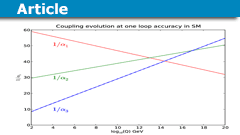
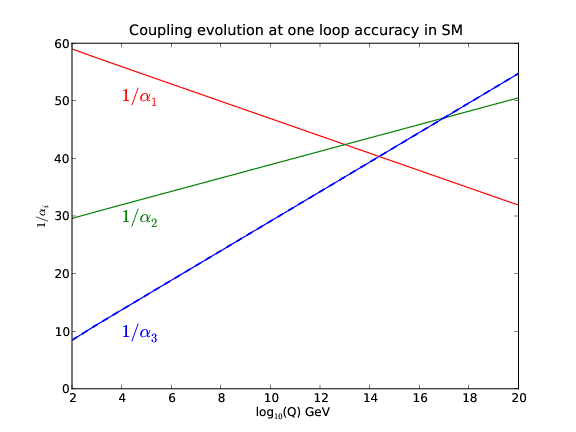
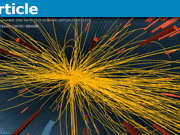


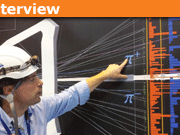
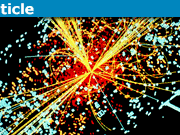

[QUOTE="JorisL, post: 5545421, member: 340962"]It's settled now http://newscientist.com/article/2101550-surfer-physicist-wins-superparticle-bet-with-nobel-laureate/[/QUOTE] It says FW has conceded, but has he actually paid up?Hmm, now who might be the next over-confident high-profile theoretical physicist from whom a wager can be extracted? :-p
It's settled now http://newscientist.com/article/2101550-surfer-physicist-wins-superparticle-bet-with-nobel-laureate/
[QUOTE=”strangerep, post: 5301397, member: 70760″]Since when is fun stupid? :oldbiggrin:[/QUOTE]
All the best things in life are free and stupid. :oldbiggrin:
[QUOTE=”eltodesukane, post: 5300048, member: 394501″]Bets are stupid.[/QUOTE] Oh c’mon — it’s just a bit of fun. Since when is fun stupid? :oldbiggrin:
[QUOTE=”eltodesukane, post: 5300048, member: 394501″]Bets are stupid.[/QUOTE]
Unless the mean (expected) value of the profit is positive.
[QUOTE=”garrett, post: 5181072, member: 31103″]Superparticle bet: Max Tegmark, Frank Wilczek, and I agreed on an extension, now decided by discovery of a superparticle by July 8, 2016.[/QUOTE] Heh, since he didn’t pay up on time I guess you will be within your rights to require an extension if superparticles [I]are[/I] found at 5 sigma by that date, on the grounds that more data acquired within a year or two thereafter might reverse the conclusion. :oldwink:
“Discovery” in this context means 5 sigma.
9 sigma with corrections for look elsewhere, and independently replicated?
Jeff Jones! It’s pretty funny that you would show up to comment here, as one of the previous superparticle bettors. I didn’t know you had done further research on SUSY — interesting paper. I’ll bet you’re one of the first in what will be a growing population of people denying they were previously string theorists. ;) But, from what I remember, you had drunk quite a bit of the cool-aid. Thanks for coming and commenting here on this PF thread. I might be willing to take on more superparticle bets, but for higher stakes. :)
[QUOTE=”arivero, post: 5165585, member: 81″]I think you should be more concrete about the kind of particle. As some of you can remember, my opinion is that the first charged slepton was discovered in 1947, and the last of the six was nailed by 1985. So it should be clear that composite theories, including composite higgs, are out of the question, even if technimeson loops were able to cancel the fermion loops of the cuadratic divergence of the Higgs. Only genuine susy particles should score in the bet.
On other hand, you can not claim the Higgs scalar sector to be susy, because N-doublet models can also generate it without supertpartners. It should be clear if the players are going to accept any new scalar as a susy particle.
At the end of the day, perhaps a bet for new physics is easier to settle than a bet for susy.[/QUOTE]
I agree that there’s a lot of wiggle room. In fact, a semi-humorous possibility is that a new particle is seen and declared to be the superpartner of an unknown particle.
It was easiest to put it in the hands of a reasonable arbiter.
There are physicists of all different races, genders, sexual orientations, proclivities, shapes, sizes… I don’t see how it is at all relevant to this discussion that I like to surf for fun and exercise.
[QUOTE=”ZapperZ, post: 5165188, member: 6230″]But are you drawing attention to the matter in question, or are you actually drawing attention to YOU?
Let’s be frank here. Your notoriety has more to do with you, than with what you have produced. The media jumped on the sexy story of a “surfer” who suddenly came up with an idea that prominent physicists suddenly took notice. If this were someone else with less intriguing of a background, I would put it to you that it would gather very little traction in publicity.
So are you really drawing attention to supersymmetry? Does it REALLY need this kind of attention, considering that the LHC has been in the front pages, and the publicity surrounding its search for supersymmetric particles has been in the news prominently?
Zz.[/QUOTE]
I’d say, it needs exactly THIS KIND of attention. For one thing, susy in 30 years has been ritualised and there is no way to approach the topic from fresh point of views; and this is the thing that we need. So histories that revolve about alternative thinking can be at the end, if they inspire the adequate random student, more profitable that the histories about the standard view of susy coming from the LHC.
It is true that Garrett’s models, as Connes’s or Furey’s and of course a lot other “alternative”, have failed to be super symmetric. This is M-isterious; how can they always come to the same kind of structures that SUSY, to objects, such as triality, that actually are in the core of the requisites for a theory to be supersymmetrical, and end which a theory which is unable to exhibit susy?
[QUOTE=”lethe, post: 5165395, member: 192″]Do the right thing and graciously extend the term of the bet a few more years to the end of the LHC run.[/QUOTE] IIUC, Garrett [I]is[/I] doing the “right thing”, as you put it. I.e., offering a new bet. For now, it is Frank’s job to do the “right thing”, and pay up. Then a new bet could be made.
[USER=31103]@garrett[/USER] : if Frank does pay the current $1K, and you both feel like increasing the new wager amount to $10K, I’ll underwrite $8K of your side of the new bet. Oh, but the new bet needs to be phrased more carefully, mentioning “5-sigma”, etc, and “found by at least 2 independent experiments”. There’s some knowledgeable experimental particle physicists around here who could probably help to tighten up the wording of the new bet.
That 40 second surfing YT that atyy pointed out [MEDIA=youtube]O7mRbYLnRfk[/MEDIA]
connected to a nice YT about “kiting” [MEDIA=youtube]M3umnYZXuh0[/MEDIA]
and to a 90 minute graphic lecture to general Maui audience about unification in E8, good visuals, intuition, lively tone, questions from audience
[MEDIA=youtube]B8lSTBmL2pY[/MEDIA]
OK, to bring this back to something serious, can I ask garrett what his take on naturalness is?
That really was the deeper reason for thinking there is something else, not necessarily supersymmetry, but something that will make physics natural.
And naturalness seems a reasonable, if not absolute requirement. It is also the spirit that lies behind the cosmological constant problem.
It comes from the belief that our current theories are effective theories, and probably wrong. So it is the opposite of egoistic thinking. This comes out of the Wilsonian understanding of quantum field theory, which was a revolution in that after that physicists said “we understand quantum field theory”. In fact naturalness seems like a rather “humble” position, because after Wilson physicists no longer “arrogantly” think that our tremendously successful theories hold at all energies.
As Preskill wonders in his blog, “Could Wilson have steered us wrong?” [URL]http://quantumfrontiers.com/2013/06/18/we-are-all-wilsonians-now/[/URL]
[QUOTE=”atyy, post: 5165228, member: 123698″]I see ZapperZ put “surfer” in quotes. Does the mean garrett isn’t a real surfer? Surely this video isn’t video faked?[/QUOTE]
What’s next? Where I put the period and question marks will also be examined this closely?
Maybe you should try reading my post backwards. There might be hidden messages in them.
Zz.
I see ZapperZ put “surfer” in quotes. Does the mean garrett isn’t a real surfer? Surely this video isn’t video faked?
[MEDIA=youtube]O7mRbYLnRfk[/MEDIA]
[QUOTE=”garrett, post: 5165148, member: 31103″]One of the reasons I went into physics is because I didn’t want to deal with people. Almost all human endeavors are centered around interactions with, or the whims of, other people. I was delighted to be able to study mathematics and physics that has an existence independent of humanity. But the idea that scientific opinion changes based on experiment alone was, and is, naive. People, including me, are rationalizing animals. When evidence starts to build that our opinions are wrong, we first respond by slightly tweaking our theories… “oh, we haven’t seen those particles yet because they must have higher masses,” until doing that gets so ridiculous that we are forced to confront reality, and change our minds. I think betting is an important part of that process. It does cater to a low-brow audience, and draw attention. But it also forces people to confront reality, so I think betting is a good thing.[/QUOTE]
But are you drawing attention to the matter in question, or are you actually drawing attention to YOU?
Let’s be frank here. Your notoriety has more to do with you, than with what you have produced. The media jumped on the sexy story of a “surfer” who suddenly came up with an idea that prominent physicists suddenly took notice. If this were someone else with less intriguing of a background, I would put it to you that it would gather very little traction in publicity.
So are you really drawing attention to supersymmetry? Does it REALLY need this kind of attention, considering that the LHC has been in the front pages, and the publicity surrounding its search for supersymmetric particles has been in the news prominently? Or are you drumming up cheap publicity?
Zz.
[QUOTE=”garrett, post: 5165170, member: 31103″]Well, the meaning of the bet was about superparticles being discovered. But I messed up in my tweet, so the decision is now up to Max.[/QUOTE]
You are probably getting paid in at least one of his worlds.
[QUOTE=”atyy, post: 5165163, member: 123698″][USER=31103]@garrett[/USER], but if they have detected and not discovered, won’t that take some months or years to decide after analysis of the data?[/QUOTE]
Well, the meaning of the bet was about superparticles being discovered. But I messed up in my tweet, so the decision is now up to Max.
[USER=31103]@garrett[/USER], but if they have detected and not discovered, won’t that take some months or years to decide after analysis of the data?
The other good thing about bets is that it brings peoples’ attention to important changes. How many famous physicists thought superparticles would be seen at the LHC? Almost nobody goes back and looks at old predictions like this:
[URL]http://www.telegraph.co.uk/news/science/science-news/3337193/The-Big-Bang-what-will-we-find.html[/URL]
[QUOTE=”Demystifier, post: 5164950, member: 61953″]The fact that Frank accepted the bet demonstrates that being intelligent and being rational are two different things.[/QUOTE]
I once heard a lecture by Steven Weinberg, in which he explained that that is called “hedging”. Of course, we know how well that has worked out.
Edit: Oops, actually Frank did the opposite of what Weinberg and Hawking did, which is to bet against their own favourites.
Sorry, post crossed,. this is in response to something Z said:
“Do you think this is a wise avenue to pursue, and how it is usually done when there is a pursuit for knowledge? Have we still not learn of what can happen when science seeks publicity to do its work?”
Well there are issues of taste. Tokens of honor like bottles of wine might seem more genteel than large dollar amounts. Humorous stakes like encyclopedias might be just as instructive to the public as large dollar amounts.
But other things being equal I think the spectacle of a few scientists with name-recognition making public wagers can be [B]educational.
[/B]
It makes the uncertainty and the suspense REAL for members of the public. IMHO the mind better grasps the issue to be resolved when it is put in those terms.
I like the fact of wagering better than some other kinds of publicizing: groundless claims, hype, oversimplified metaphors, rhetoric.
One of the reasons I went into physics is because I didn’t want to deal with people. Almost all human endeavors are centered around interactions with, or the whims of, other people. I was delighted to be able to study mathematics and physics that has an existence independent of humanity. But the idea that scientific opinion changes based on experiment alone was, and is, naive. People, including me, are rationalizing animals. When evidence starts to build that our opinions are wrong, we first respond by slightly tweaking our theories… “oh, we haven’t seen those particles yet because they must have higher masses,” until doing that gets so ridiculous that we are forced to confront reality, and change our minds. I think betting is an important part of that process. It does cater to a low-brow audience, and draw attention. But it also forces people to confront reality, so I think betting is a good thing.
I suppose that scientific research can be understood as decision-making under uncertainty, maybe even [B]game theoretically[/B] or within a [B]BAYESIAN[/B] framework.
We are never completely sure that any theory is 100% correct, or that it cannot be improved on, but we bet on it every time we make a calculation that matters. People routinely make decisions in the face of incomplete knowledge and can be said to bet their credibility, bet their careers, funding, professional standing, perks, on the which lines of research they choose to pursue.
[B]There is nothing immoral or frivolous about this, AFAICS.
[/B]
I don’t know any “better” way to ascribe [I]operational[/I] meaning to probabilities than to use the example of a rational bettor–probabilities are the odds.
what we call verification and non-verification are defined in terms of odds, i.e. probabilities.
[QUOTE=”garrett, post: 5165113, member: 31103″]Yes, I made this bet, and this post, to attract attention, so that people would think more about whether or not supersymmetry exists, and the implications of that.[/QUOTE]
Do you think this is a wise avenue to pursue, and how it is usually done when there is a pursuit for knowledge? Have we still not learn of what can happen when science seeks publicity to do its work?
And since when does it require people to “think more” to determine if this exists or not? Isn’t the final arbiter will be experimental verification, or non-verification?
Zz.
[QUOTE=”ZapperZ, post: 5165084, member: 6230″]Unfortunately, it appears that the sideshow is a major distraction and has occupied center stage. Would you have created this if it weren’t for the “sideshow” to attract an audience?
And what exactly do you hope to accomplish with this bet, regardless of who “wins”?
Zz.[/QUOTE]
Yes, I made this bet, and this post, to attract attention, so that people would think more about whether or not supersymmetry exists, and the implications of that.
[QUOTE=”garrett, post: 5165066, member: 31103″]Betting in physics is a sideshow.[/QUOTE]
Unfortunately, it appears that the sideshow is a major distraction and has occupied center stage. Would you have created this if it weren’t for the “sideshow” to attract an audience?
And what exactly do you hope to accomplish with this bet, regardless of who “wins”?
Zz.
[QUOTE=”ZapperZ, post: 5165025, member: 6230″]Betting? Really? Have we sank to THAT level?
I find that all these “betting” is irrelevant to the physics. This is nothing more than a “My Ego Is Bigger Than Your Ego” demonstration.
Zz.[/QUOTE]
Betting in physics is a sideshow.
Betting? Really? Have we sank to THAT level?
I find that all these “betting” is irrelevant to the physics. This is nothing more than a “My Ego Is Bigger Than Your Ego” demonstration.
Zz.
[QUOTE=”Demystifier, post: 5164950, member: 61953″]The fact that Frank accepted the bet demonstrates that being intelligent and being rational are two different things.[/QUOTE]
I think it speaks more of the importance of personal perspective in physics. When you personally first do a calculation, as Frank did for supersymmetric coupling unification, and it produces a result that appears to be true and important about nature, when there was no reason it had to be, it’s a bit of a shock. That personal experience gives you a lot of confidence in that idea. That is the way I feel about the match of GR and Standard Model structure to the E8 Lie group. And I suspect that’s the way Frank Wilczek feels about supersymmetry. This is one of many reasons why it’s good to have physicists searching along different paths.
[QUOTE=”Spinnor, post: 5164839, member: 170849″]You should make more bets! Pay up Frank!
Would you give back the money if super-particles are eventually found?[/QUOTE]
I would happily make another bet on it.
The fact that Frank accepted the bet demonstrates that being intelligent and being rational are two different things.
The Pacific Science Institute link is broken.
Bets are stupid.
Well, you've started it. Your comments reek of negativity towards Garret. If you don't like him just say so.
I like the notion of bets but also think its been overdone. Each bet ups the ante from before.Now if your bet winnings were for a noble charity then the news would help the charity as well, everyone wins and altruism triumphs again.
Superparticle bet: Max Tegmark, Frank Wilczek, and I agreed on an extension, now decided by discovery of a superparticle by July 8, 2016.
Garrett,Sorry about my ignorance. When I mentioned my primitive layman's explanation for 3 generations as a possible help to your E8 theory, I was completely unaware that you had submitted a proposed solution to this issue, nearly a month ago, and that there was an entire thread devoted to this new development in the Beyond The Standard Model section here.I started reading that thread this morning, and I have to say that there is a vast amount that I need to learn before I could even hope to grasp what it's all about. But reading the Scientific American 2010 article "A Geometric Theory of Everything" that you co-authored with James Weatherall, was just the ticket for a layman like me, though I fell asleep, before the 2nd page, as it was late in the evening.
@Garrett:I have to admit that I jumped on the supersymmetry bandwagon back in the mid 90s, with my own speculative take on the theory. So it's disappointing that no superpartners have shown up. However, a couple of years earlier I had another idea, not requiring supersymmetry that would explain why there are 3 families of fundamental particles. Seeing that your E8 Lie group based theory can't accommodate the 3 generations, perhaps this idea could be worked into your theory to make it more viable.I sent you a personal email this morning with a short description of the idea, and links to my website.Dave Schroeder
Well if string theorist means "person who believes string theory is valid and important for physics" then sure… I'm a string theorist. I don't deny having drunk the kool-aid, I just can't claim that I was a string theorist in what I'd consider the correct sense of the word, which means "someone who has published research on string theory".I saw myself following in the footsteps of other particle phenomenologists and model builders like Nima Arkani-Hamed, who aren't string theorists in the sense of having helped develop string theory itself any further, but tend to accept the validity of string theory as a given and use it as a guide to decide where to direct more practical research efforts (like trying to figure out what we'll see at LHC or what the nature of dark matter is).
I think you should be more concrete about the kind of particle. As some of you can remember, my opinion is that the first charged slepton was discovered in 1947, and the last of the six was nailed by 1985. So it should be clear that composite theories, including composite higgs, are out of the question, even if technimeson loops were able to cancel the fermion loops of the cuadratic divergence of the Higgs. Only genuine susy particles should score in the bet.On other hand, you can not claim the Higgs scalar sector to be susy, because N-doublet models can also generate it without supertpartners. It should be clear if the players are going to accept any new scalar as a susy particle.At the end of the day, perhaps a bet for new physics is easier to settle than a bet for susy.
"And, many years previously, I had won a bet with two string theory grad students (who have since left the field) about superparticles showing up."I think technically, our bet expired Burning Man 2010, so it was still open as of the time you made the bet with Wilczek ;-pAlso, I never worked directly on string theory, just supersymmetry. (Although Sean did a bit.)Incidentally, the last paper I published was a 2-loop analysis of how the SUSY partners affect SU(5) gauge coupling unification in supersymmetric extensions of the Standard Model that go beyond the ordinary minimal one people call the MSSM. http://arxiv.org/abs/0812.2106I have to admit, by the time I was done with this paper, I had realized that the case for supersymmetric gauge coupling unification is a bit weaker than I'd once thought. (For the most basic case, it works better at 1-loop than 2!) But it's nevertheless an interesting coincidence; taken together with how naturally it solves the hierarchy problem and provides an easy dark matter candidate, I still think there's a decent chance we may yet find it at LHC.I'm happy to settle our bet next time I see you, unless you want to go double or nothing? I guess you've got bigger fish to fry now, but I'm still game if you want to make it 2 margaritas ;-) I hope Wilczek also goes double or nothing with you!
Do the right thing and graciously extend the term of the bet a few more years to the end of the LHC run.
To the question what someone wins by betting:FUNand money if you are on the winning side… it has little to do with science, since we are all subject to what nature shows us…It can be the same if you bet that "tomorrow it'll rain in NYC"…you are not going to understand the weather physics any better :P
As Garrett's lawyer I would argue to the arbitratorDetect is defined as "discover or identify the presence or existence of."Even though the potential to comprehend the discovery must occur at a later time, the data was still detected. Indeed, the collection of the data is the detecting process; the discovery, is the comprehension or understanding that the data proves the scientific point being reached. In this case, the existence of superparticles.
Really interesting! Would love a follow up sometime!
You should make more bets! Pay up Frank!